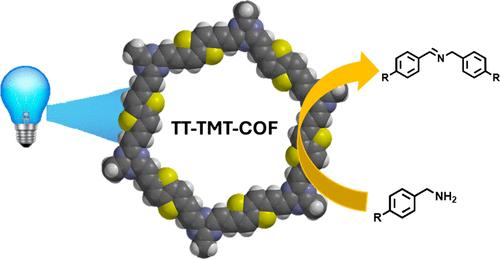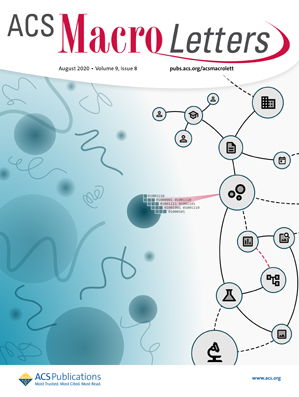A Thienothiophene-Based Olefin-Linked Covalent Organic Framework for the Metal-Free Photocatalytic Oxidative Coupling of Amines
IF 5.1
Q1 POLYMER SCIENCE
引用次数: 0
Abstract
The oxidative coupling of amines is a useful way to prepare many diverse compounds for the pharmaceutical and chemical industries. Covalent organic frameworks (COFs), a crystalline class of porous polymers, have emerged as promising heterogeneous photocatalysts that can accomplish this transformation under metal-free conditions due to their excellent photochemical stability and tunable electronic properties. Herein, we report the optoelectronic and photocatalytic properties of an olefin-linked COF containing thienothiophene (TT) and 2,4,6-trimethyl-1,3,5-triazine (TMT) units. The TT-TMT-COF exhibited a narrow band gap with extended light absorption and excellent charge separation, making it useful for the oxidative coupling of various benzylamines. The TT-TMT-COF exhibited fast reaction times, excellent recyclability, and conversions as high as ∼99%. The reactivity of TT-TMT-COF was on par or significantly better than that of a few small molecule 2,4,6-tris((E)-2-(thieno[3,2-b]thiophen-2-yl)vinyl)-1,3,5-triazine (TT-TMT) and 2,4,6-tris((E)-2-(thiophen-2-yl)vinyl)-1,3,5-triazine (Thio-TMT) homogeneous catalytic systems containing similar functional units. This work further highlights the ability of the COF to perform useful and efficient catalytic transformations in a sustainable manner.

用于胺类无金属光催化氧化偶联的噻吩基烯烃连接共价有机框架
本文章由计算机程序翻译,如有差异,请以英文原文为准。
求助全文
约1分钟内获得全文
求助全文
来源期刊
CiteScore
10.40
自引率
3.40%
发文量
209
审稿时长
1 months
期刊介绍:
ACS Macro Letters publishes research in all areas of contemporary soft matter science in which macromolecules play a key role, including nanotechnology, self-assembly, supramolecular chemistry, biomaterials, energy generation and storage, and renewable/sustainable materials. Submissions to ACS Macro Letters should justify clearly the rapid disclosure of the key elements of the study. The scope of the journal includes high-impact research of broad interest in all areas of polymer science and engineering, including cross-disciplinary research that interfaces with polymer science.
With the launch of ACS Macro Letters, all Communications that were formerly published in Macromolecules and Biomacromolecules will be published as Letters in ACS Macro Letters.

 求助内容:
求助内容: 应助结果提醒方式:
应助结果提醒方式:


